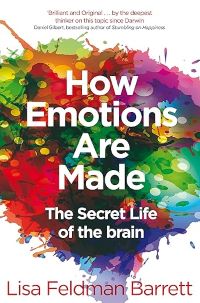 448 pages (including appendices)
448 pages (including appendices) 9 CE credits
Course Enrollment
$210.00
Add to Cart
All exams are taken online. The exam for this course will be available in "My Courses" immediately upon enrollment. Note the book is not included.
The book is available for purchase from Amazon.
As an Amazon Associate we receive a rebate from qualifying purchases.
How Emotions Are Made
The Secret Life of the Brain
Lisa Feldman Barrett, PhD.Pan Books, 2018
DESCRIPTION
Lisa Feldman Barrett's How Emotions Are Made: The Secret Life of the Brain challenges traditional views of emotions as universal, biologically hardwired responses. Instead, Barrett introduces the theory of constructed emotion, arguing that emotions are actively created by the brain based on past experiences, cultural influences, and sensory information. She explains how emotions are shaped by predictive processes in the brain, rather than being automatic reactions to external stimuli. This perspective has profound implications for understanding human behavior, emotional intelligence, and even legal and societal norms.
EDUCATIONAL OBJECTIVESThe reader will be able to:
• Describe the key components of the theory of constructed emotion and its distinction from traditional views on universal, biologically hardwired emotions.
• Explain how the brain's predictive processes shape emotional experiences using examples from Barrett's research.
• Identify cultural and environmental factors that influence the construction of emotions and their variability across individuals.
• Analyze the implications of the theory of constructed emotion for emotional intelligence and its application in personal or professional settings.
• Evaluate how the concepts presented in the book could inform societal norms, legal systems, or mental health practices.
AUTHOR
Lisa Feldman Barrett, PhD, is a globally renowned psychologist and neuroscientist, ranked among the top most cited scientists for her revolutionary research on emotion and brain function. She is University Distinguished Professor of Psychology at Northeastern University, with additional roles at Harvard Medical School and Massachusetts General Hospital. Author of How Emotions are Made and Seven and a Half Lessons About the Brain, she has published over 275 scientific papers in leading journals. Honored with awards like the NIH Director’s Pioneer Award and a Guggenheim Fellowship, Dr. Barrett has shared her expertise through a widely viewed TED talk, Congressional testimony, presentations to organizations like the FBI, and leadership as president of the Association for Psychological Science.
EDITORIAL REVIEWSHow Emotions are Made did what all great books do. It took a subject I thought I understood and turned my understanding upside down.
-- Malcolm Gladwell
[STARRED REVIEW] Prepare to have your brain twisted around as psychology professor Barrett takes it on a tour of itself. Her enthusiasm for her topic brightens every amazing fact and theory about where our emotions come from.
-- Booklist Reviews, February 15, 2017
[STARRED REVIEW] A well-argued, entertaining disputation of the prevailing view that emotion and reason are at odds. [Barrett contends that] we are responsible for our individual actions, of course, but we also bear responsibility for working to eliminate racial prejudice, gender stereotyping, and the like from our society... [This] has important legal as well as moral implications and leads into the thorny questions surrounding free will. A highly informative, readable, and wide-ranging discussion.
--Kirkus Reviews, January 2017
A brilliant and original book on the science of emotion, by the deepest thinker about this topic since Darwin.
--Daniel Gilbert, best-selling author of Stumbling on Happiness
ISHK CE at Home
1702-L Meridian Ave., #266
San Jose, CA 95125-5586
This website uses cookies to ensure you get the best experience on our website. Learn more
